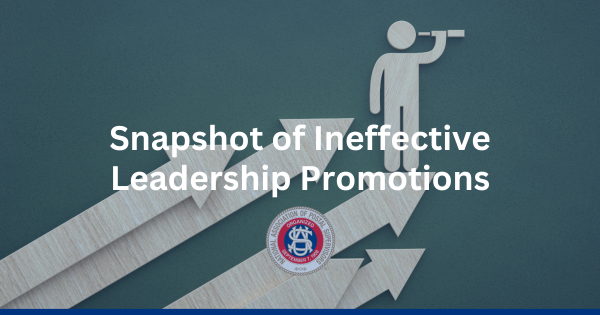Snapshot of Ineffective Leadership Promotions
Snapshot of Ineffective Leadership Promotions
By John Aceves
Former NAPS Secretary/Treasurer
Promotion of individuals to leadership roles is a pivotal element in the Postal Service. However, the repercussions can be far-reaching when promotions are misaligned, as well as promoting someone less competent at people management and communication. This could lead to a negative and toxic workplace environment.
Leaders are not merely task managers; they are mentors, motivators and mediators. When individuals lacking these essential people skills are promoted, the consequences can be detrimental. An effective leader must be adept at recognizing and addressing the needs and concerns of their team. Without these skills, these so-called leaders struggle to build rapport, leading to disengagement and dissatisfaction among EAS employees.
Ineffective leadership can lead to a decline in productivity. Employees who lack clear direction and support may struggle to meet expectations, leading to missed deadlines and performance concerns. Additionally, a toxic work environment can drain employees’ energy and enthusiasm, diminishing their output.
Leaders who rely on frivolous discipline and an autocratic style create a culture of fear and resentment s. This negative and toxic workplace culture can manifest in various forms, challenging the USPS’ and individuals’ long-term success.
These types of promotions without the requisite skillset resort to autocratic leadership, toxic styles and rigid controls. You know them. We all have worked for a few in our postal careers. This approach may yield short-term results, but at what cost?
EAS employees subjected to autocratic leadership feel undervalued, leading to decreased morale and motivation. If you are in this type of environment, do not suffer in silence—document, document and expose them. Let someone know—the next manager level, HR or your local NAPS officers, but let someone know.
Leaders must articulate their vision, provide feedback and navigate with clarity. A leader who lacks these communication skills risks creating confusion and misalignment. This can lead to errors, decreased efficiency and a general sense of frustration. Furthermore, the inability to listen actively and respond thoughtfully can erode trust and respect needed for a cohesive team.
Senior management promotions should encompass not only an individual’s technical skills and performance metrics, but also their interpersonal abilities and leadership potential. If they have a history of creating a negative and toxic work environment, “why continue to promote them?”
With a supportive environment, the USPS can ensure their leaders are well-equipped to inspire and guide their EAS teams toward achieving mutual goals. And in so doing, develop a positive and thriving organizational culture for all EAS employees and the Postal Service.
A shout out to those in leadership positions who truly manage with positive, participative leadership.
Hasta luego.
